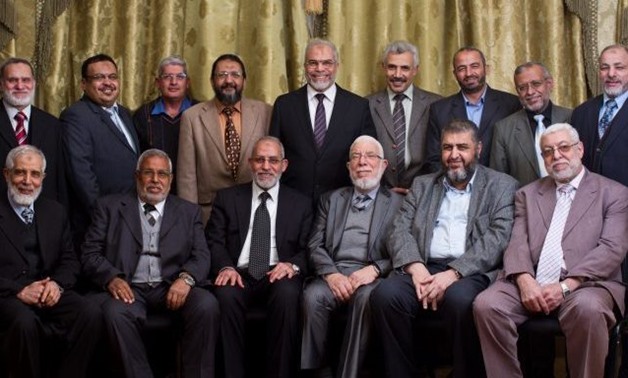
Leaders of the outlawed Muslim Brotherhood group - FILE
CAIRO - 16 July 2018: The judgment of 28 defendants, who belong to the Muslim Brotherhood, in their retrial over storming the Egyptian eastern borders during the 2011 revolution will be proclaimed Aug. 10. Below are Q&A on the most important aspects of the case.
How many sessions have been held for the case?
The court has held 85 sessions, starting from Feb. 26, 2017 until July 13, 2019, where presiding judge Mohamed Sherin Fahmy announced Aug. 10 as the date for his decision on the case.
Who deliberates the high-profile case?
District 11 of the terrorism section at South Cairo Criminal Court deliberates the case, presided by Fahmy and assisted by judges Essam Aboul Ela, Hassan al-Sayes and judicial secretary Hamdy al-Shennawy.
Who are the most prominent witnesses who testified in the case?
Former President Hosni Mubarak, his Interior Minister Habib al-Adly, his former head of the State Security department Hassan Abdel Rahman, former Interior Minister Mahmoud Wagdy, who took control of the ministry after Adly in 2011, former head of Prison 430 in Natrun Valley, Major General Essam Lotfy, former assistant to the interior minister for the Central Security department in Sinai, Major General Maged Nouh.
What are the most important events witnessed during the long trial?
- General-Secretary of the Freedom and Justic Party Mohamed Beltagy requested changing the judges, but the Appeal Court refused.
- Videos were shown to the court, showing the sabotage of Natrun and Marg prisons.
Mubarak testified before the court.
- The prosecution demanded a billion pounds as temporary compensation from the defendants.
- The prosecution presented the names of convicts who escaped from prisons in 2011.
- The prosecution demanded the maximum penalty against the defendants.
- The prosecution delivered the death certificate of former President Mohamed Morsi, a defendant in the case, after he passed away during another trial.
The defendants are charged with storming the Egyptian borders, attacking security institution, plotting with Hamas and the international organization of the Muslim Brotherhood, and Hezbollah to create chaos in Egypt to bring down the authorities, as well as having the Iranian Revolutionary Guards train groups in Egypt to sabotage military targets in the country, including prisons.
The first trial resulted in sentencing Morsi, Muslim Brotherhood Supreme Guide Mohamed Badie, his deputy Rashad al-Bayoumi, member of the Guidance Bureau of the Islamist Group Mohyee Hamed, former parliamentary speaker Saad al-Katatni, and vice chairman of the Freedom and Justice Party Essam al-Erian to death. Twenty others were sentenced to life in prison.
The new judgment may also be appealed, and if the appeal is accepted, the Cassation Court will deliberate the case and issue the final verdict.
Prominent members of the Muslim Brotherhood, Hamas and Hezbollah escaped during the 2011 prison break, including Morsi. Many believe they escaped with assistance from Iranian and Palestinian elements who infiltrated into the Egyptian borders with Gaza.

Comments
Leave a Comment